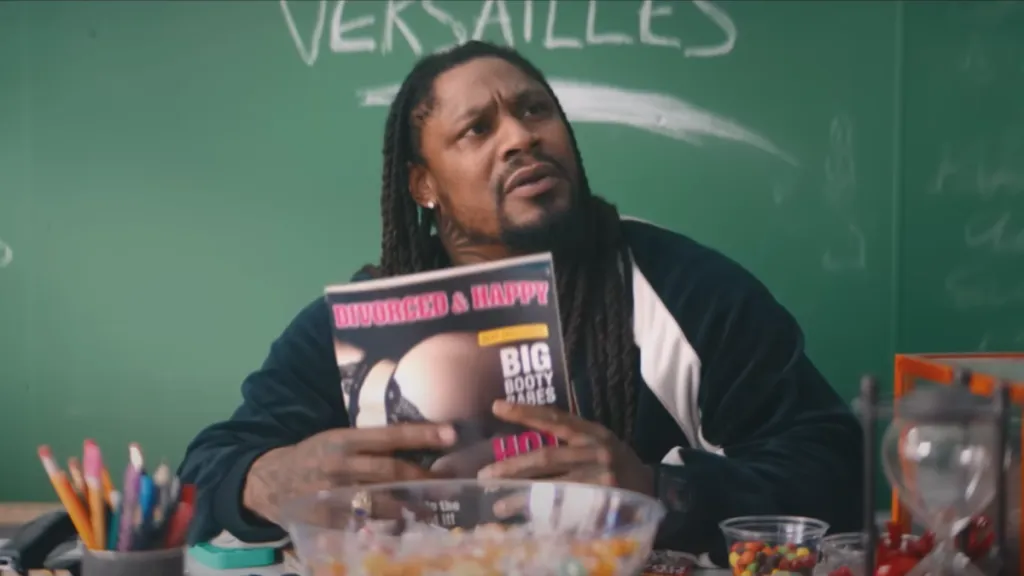I Think You Should See: Marshawn Lynch in "Bottoms"
He plays the part of an amazing ally.

A few weeks ago, I had a song stuck in my head. It was by Omar Apollo, one of the many new musicians I’ve discovered through my trailblazing old-millennial process of just clicking around on Tidal until I find something that sounds decent, and it was a fun little thing about hooking up with your ex even though you clearly outrank them in the hotness and life-potential department. Look, here it is:
Anyway, I was humming this song for the better part of a week before I realized that the ex in question was a dude. This is one of the more heartening developments of the past two decades: The kids are all just sort of gay now! It's not a big deal! There isn’t a big controversy about a man calling his ex “bruh” in a breakup song; there isn’t a magazine cover every single time some new pop star comes out, not least because many of them were never closeted in the first place. It’s just assumed that lots of people are queer now — or, at least, that lots of celebrities are; the average American high schooler is not quite so fortunate — and we can move on to discussing their work.
Bottoms, in case you hadn't heard, is a lesbian teen sex comedy. It stars two buzzy young actresses — Ayo Edibiri, from The Bear, and Rachel Sennott, from Bodies Bodies Bodies — neither of whom seem too worried that being associated with the phrase “lesbian teen sex comedy” will hold them back or result in typecasting. Edibiri came out as queer during the promotional process; Sennott seemingly came out as straight. Again, neither one made a big deal out of this, and it’s assumed that the audience for Bottoms will not make a big deal out of it, either. Providing perfect Queer Representation is fundamentally less important than making a decent movie.
So I will skip the question of Queer Representation. I will point out only in passing that it was directed by a woman — Emma Seligman, who is herself gay; she and Sennott co-wrote the screenplay — and that it’s precisely the kind of Apatovian shambolic loser-comedy that feminists spent ten years saying a woman would never get to make. It really was a political project to make movies like these, at one point. There was that one weekend when we all had to go and watch Bridesmaids, for the Movement, and then we all had to go and write thinkpieces about whether Bridesmaids was (a) a once-in-a-lifetime peak experience, the pinnacle of both cinema and feminism or (b) a disgusting and unforgivable betrayal of all feminism's most sacred principles because it contained fat jokes. Allowing it to be just some movie was never on the table. Then Bridesmaids made money, so there were more female-driven comedies, so Broad City got greenlit, so there were more comedies that were both female-driven and sort of gay, and now Bottoms exists, and no-one's mind is blown.
This is the thing I've learned about progress: By the time you finally reach all those big, impossible, game-changing goals, they're not going to look impossible or game-changing any more. The world will have changed so much that they look normal. So, in the service of being chill about Bottoms, a movie that is both possible and normal in 2024, I will go straight to the point, and tell you about the part that really moved me. That part is trailblazing male feminist, ally, and my new Positive Masculinity role model, a history teacher played by former NFL running back Marshawn Lynch.